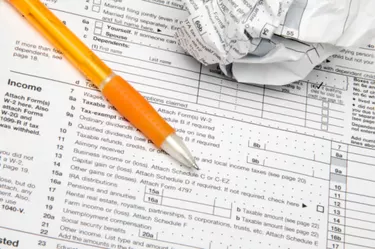
The 1099 is a form that the IRS asks taxpayers to use when reporting payments other than wages and salaries. A suffix helps identify the reason for the 1099. For example, a 1099-DIV reports payments for dividends. An independent contractor may receive a 1099-Misc from each of his clients reporting his earnings. The IRS has specific rules for the types and minimum amounts of income to report, and the Oklahoma Tax Commission also has regulations regarding reportable activity and filing deadlines.
Deadlines
Video of the Day
Normally, the Oklahoma Tax Commission must receive copies of the 1099 forms and the applicable summary form no later than February 28 of the year following the tax year for which the 1099s apply. If income tax is withheld from royalty payments to residents of other states, the deadline is January 31. Pass-through entities who withhold income tax from payments to residents of other states must file by February 28 if the entity's tax year ends on December 31 or by the last day of the second month following the entity's tax year-end if the entity is not a calendar-year filer. The recipient is to receive her copy of the 1099 by the same dates.
Video of the Day
Reportable Amounts
Under Oklahoma regulations, payments in excess of $750 during the calendar year require the payor to issue a 1099. The limit is $10 if the payments are for royalties. If the payor is a corporation, the reportable limit for interest or dividend payments is $100.
Reportable Activities
If an individual, corporation or other entity makes payments of at least $750 to a professional individual who is either a resident of Oklahoma or provides services in the state, he must issue a Form 1099 to the professional.
Form 1099-G
The Oklahoma Tax Commission issues a Form 1099-G to taxpayers who overpay state income taxes. If the taxpayer itemized deductions on his federal return, the refund may be taxable. If the taxpayer claimed the standard deduction, the refund is not taxable and he may disregard the form. The instructions for the IRS Form 1040 and its Publication 525 contain worksheets to determine whether any part of the overpayment is taxable.